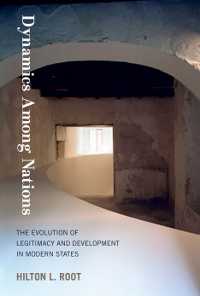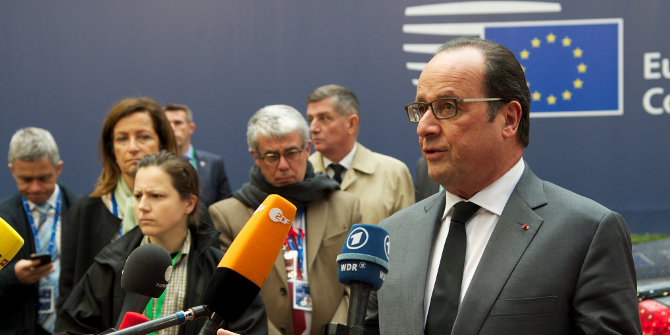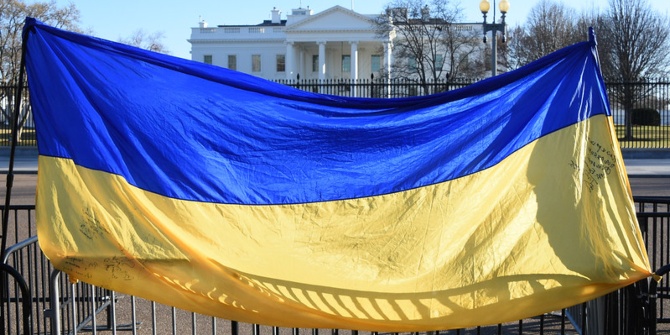 In Dynamics among Nations, Hilton Root looks at the waning influence of the West’s policy of liberal internationalism in the face of rising demand for alternative forms of development, centered on China. Peter Trubowitz finds the book’s argument to be a compelling one, but also argues that it may underestimate the continuing ‘demand’ for liberal internationalism, and downplay fears in Asia of American abandonment in the face of China’s increasing economic and geo-political power.
In Dynamics among Nations, Hilton Root looks at the waning influence of the West’s policy of liberal internationalism in the face of rising demand for alternative forms of development, centered on China. Peter Trubowitz finds the book’s argument to be a compelling one, but also argues that it may underestimate the continuing ‘demand’ for liberal internationalism, and downplay fears in Asia of American abandonment in the face of China’s increasing economic and geo-political power.
This is the first in USAPP’s new series of Book Review Forums. Click here to to read the response of the book’s author, Hilton Root.
 Dynamics among Nations: The Evolution of Legitimacy and Development in Modern States. Hilton Root. MIT Press. November 2013.
Dynamics among Nations: The Evolution of Legitimacy and Development in Modern States. Hilton Root. MIT Press. November 2013.
Hilton Root has written a valuable book on the dynamics of global politics and international change. While many will want to read the book for its thoughtful contributions to the study of institutional change and economic development, it also speaks directly to the current debate over the future of liberal internationalism, what Root dubs “the foreign policy of the West.” As he sees it, liberal internationalism is on the wane. Much of the book seeks to explain why, and this is what I want to focus on here.
For Root, the defining feature of our time is the global diffusion of economic power. Patterns of worldwide trade are shifting. The global South is becoming more important to the world economy; the global North, less so. This shift, Root argues, is not shaking out according to the predictions of Western models of economic development. Instead of a top-down, North-South process of emulation and inculcation of liberal norms, the global economy is fragmenting and decentering. Manufacturing and trade are dispersing and recombining into South-to-South networks that have little interest or need for the values and beliefs the West is promulgating. The problem, as Root sees it, is that what liberal internationalism offers as a pathway to modernity is no longer very attractive to states rapidly moving up the international ladder.
Root is not the only scholar to identify this decentering process, or to point to a world in the not too distant future when there will be, as he puts it, “No Captain at the Helm.” Charles Kupchan’s book, No One’s World, makes a similar prediction. So does Ian Bremer’s Every Nation for Itself. But Root reaches that conclusion from a different starting point. Drawing on complexity theory, he sketches an evolutionary process that helps explain why liberal internationalism has lost some of its luster and why going forward, the liberal West won’t be the focal point of global trade. In his account, the problem is not that Western values and norms are in shortly supply – the West isn’t caput. It’s that the demand for those values is rapidly diminishing as alternative development models (most notably, Beijing’s authoritarian capitalism) are gaining traction in a world where Western and especially American power is weakening.
It’s a compelling argument that will be of interest to international relations scholars as well as students of Comparative Politics. Yet for all its strengths, it rests on a conception of liberal internationalism that I think leads Root to downplay and underestimate the continuing “demand” for liberal internationalism.
Root equates liberal internationalism with ideas such as economic openness, international cooperation, and nation building. Indeed, he grounds liberal internationalism in modernization theory. Its key tenets are the widely held beliefs that economic growth and democracy are mutually reinforcing, and that increased trade will lead to sociopolitical convergence and greater global cooperation.
That this is part of the liberal internationalist “gestalt” is clear. But in America’s hands, liberal internationalism has always been more than promoting a particular path to the “promised land” of modernity. It’s been as much about guaranteeing security in a world in which economic wealth often whets a state’s geopolitical appetites. During the Cold War, states that were willing to subscribe to the American modernization agenda of economic openness and free trade also enjoyed the benefits of America’s military umbrella that provided security and protection from states that did not. Economic partnership and military power were coupled. This gave many developing states a double incentive to buy into America’s international agenda. Many did and many are likely to continue doing so, for security if not economic reasons.
Why? Because the very process of economic diffusion that Hilton describes will give them incentives to do so. Root is right when he says that South-South trade is becoming more important to the global economy. But the vast bulk of that South-South trade is centered in one region of the world – Asia. Yes, the Middle East and Africa are part of the story; Latin America too. But intra-regional Asian trade accounts for 40 percent of all South-South trade today. This matters because if there’s one country that offers the most plausible alternative to Hilton’s version of liberal internationalism, it’s China. The problem is that China is also the country that poses the single greatest threat to its neighbors in “the hood.” In short, the Middle Kingdom attracts and repels at the same time.
If Root’s analysis is right, we should expect to see less demand for liberal internationalism in Asia. But is that what we are seeing? I don’t think so, at least not when one factors the security dimension into liberal internationalism. Indeed, the great fear in Asian capitals today is not that the U.S. will try to impose its values and beliefs on the region, but rather that it will not make good on its commitments to the region’s security. American abandonment, not U.S. interference, is what worries Asian leaders today.
What I’m suggesting here is that Asia’s leaders are not only asking the micro-foundational question that Hilton poses at the end of the book. He asks: “If they [the nations of East Asia] can partner with China for trade, why risk signing on to a program [America’s liberal internationalism] that might reduce their personal power and diminish their longevity in office?” (p. 231). That’s a fair question, but for Asian leaders there is a second micro-foundational question, which is only now coming into focus. It goes something like this: “How can I guarantee my state’s autonomy and my own hold on power if the United States is unwilling to discourage China from converting its economic wealth into geopolitical power?
As anyone who follows political developments inside the United States knows, this is not an idle concern. It’s real. Public support for liberal internationalism is weakening. Opinion polls show that Americans are increasingly weary of paying the “overhead costs” of liberal internationalism at a time of sluggish growth and increasing inequality. There is some irony in this, because if there’s one thing that America and the West might do to counter the growing South-South economic axis that Root describes, it’s expanding trans-Pacific and trans-Atlantic trade. But both are currently on hold, and the reason is not an absence of support for liberal internationalism abroad. The problem is a shortage of support in the United States itself.
From this perspective, the real problem facing liberal internationalism is one of supply, not demand. The question is not whether others will see advantage in working within the Western rule-based system, but whether the chief guarantor of that system will have the political will to continue underwriting that order. This is why we see so much anxiety in Asia about political developments in the United States. If the U.S. won’t provide security, who will?
So does this mean that Root is wrong when he argues that liberal internationalism is no longer the only game in town? No: he’s right about that. Power is diffusing and this creates political space for alternative models of governance and growth. But that same process fuels international insecurity. This is easiest to see in Asia, but it’s not inconceivable that we could see something similar in other regions, perhaps in Latin America as Brazil gains power and influence in the region. To my mind, the real analytic challenge identified by Dynamics among Nations is this: how can we manage and contain the regional insecurity dynamics that a world of diffusing global power is certain to fuel?
Featured image credit: richie c (Creative Commons BY NC SA)
Please read our comments policy before commenting.
Note: This article gives the views of the authors, and not the position of USApp– American Politics and Policy, nor of the London School of Economics.
Shortened URL for this post: http://bit.ly/1lmvWLs
——————————————–
About the author
 Peter Trubowitz – Department of International Relations
Peter Trubowitz – Department of International Relations
Peter Trubowitz is Professor of International Relations at the LSE. He specializes in the field of U.S. grand strategy and foreign policy and is the author of Politics and Strategy: Partisan Ambition and American Statecraft (Princeton University Press) and Defining the National Interest: Conflict and Change in American Foreign Policy (University of Chicago Press), as well as numerous journal and magazine articles. Before joining the LSE, Trubowitz was Professor of Government at the University of Texas at Austin, where he taught in the fields of international security and foreign policy. He received his Ph.D. from MIT.






